The Portal Token Bridge is a cross-chain protocol designed for efficient crypto token transfers between a number of leading blockchains
This article was written for Everstake, a major staking validator for several tokens.
Client: Everstake
Website: wormholenetwork.com, portalbridge.com
everstake.one
Token: N/A
This article was written for Everstake, a major staking validator for several tokens.
Client: Everstake
Website: wormholenetwork.com, portalbridge.com
everstake.one
Token: N/A
Link to original article online: https://medium.com/everstake/what-is-the-wormhole-token-bridge-an-overview-of-the-project-4653ba2c92e9
Sometimes links get changed, which is out of our control, so here’s a PFD download of the article, as well as a text version below.
A few years ago, the world of decentralized apps (dApps) and tokens was all about the Ethereum platform. But today, things have changed drastically, and blockchains such as Solana, Binance Smart Chain (BSC), and Polygon are now home to a thriving and growing variety of dApps and passionate communities.
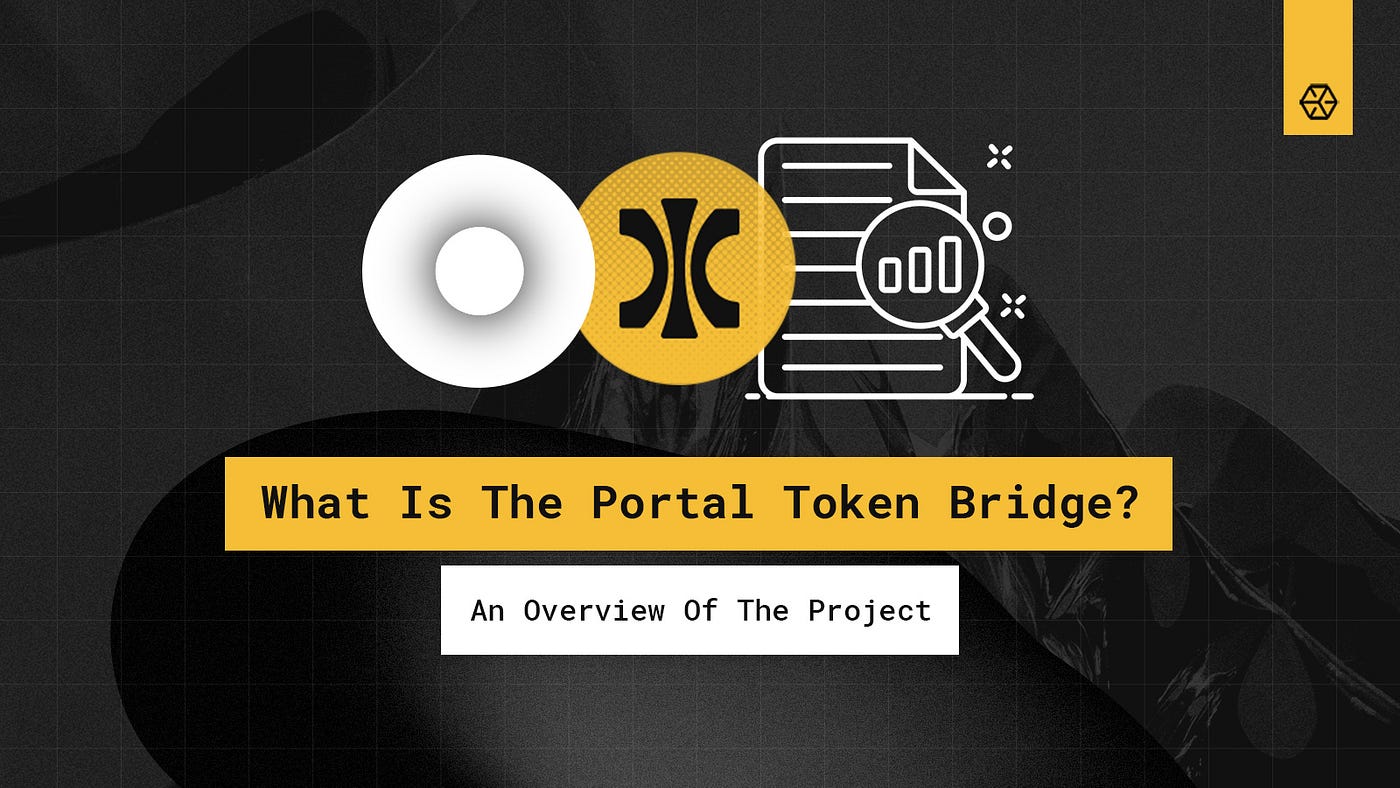
However, the growth of these blockchains has given rise to a new issue — cross-chain interoperability. By and large, blockchain platforms are independent states with their own rules and without a native ability to support cross-platform token transfers.
In this environment, cross-chain bridges protocols enabling interoperability between different blockchain networks are growing in popularity. One of the most notable of these bridges is the Portal Token Bridge. So in this article, we’ll have an in-depth look at what the Portal Token Bridge is as well as its implications on the blockchain space.
Note: Some time ago, Wormhole made a rebranding. To not be confused now, Wormhole is a protocol, while Portal is a token bridge (formerly known as Wormhole Token Bridge). Let’s find out more about Wormhole and Portal token bridge.
The Portal Token Bridge is a cross-chain protocol designed for efficient crypto token transfers between a number of leading blockchains. Originally built on Solana as a bi-directional bridge for Solana and Ethereum cross-transfers, Portal now supports transfers between seven distinct platforms, which include:
The seven chains supported by the Wormhole and Portal token bridge collectively have a total value locked (TVL) of around $201 billion USD, which represents 88% of the entire DeFi industry TVL of $229 billion.
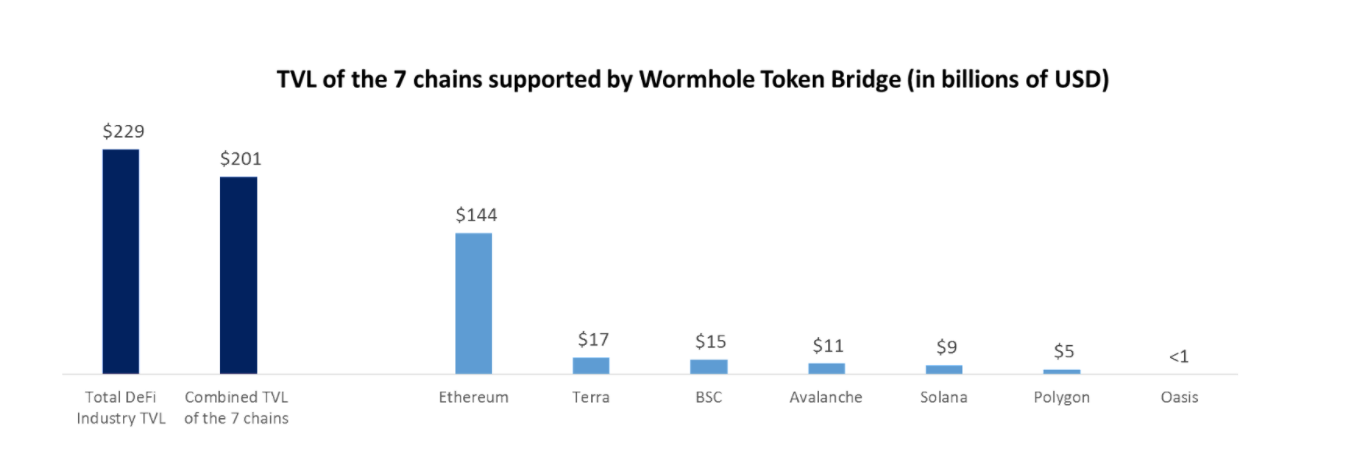 The source of the figures: DeFiLlama.com. The figures are valid as of January 11, 2022
The source of the figures: DeFiLlama.com. The figures are valid as of January 11, 2022
When users send tokens from one platform to another, Portal wraps the transferred tokens on the destination platform into a platform-specific wrapped token format. For example, if you send some BNB coins from BSC to your wallet on Solana, the funds will arrive as wrapped BNB (WBNB) coins based on Solana’s SPL token format.
The Portal token bridge uses special validator nodes called Guardians to enable the cross-chain transfer process. The guardian nodes continually monitor the transfer activity on the bridge. When a user requests a transfer, the nodes verify the request, register it, and burn the sender platform’s native tokens in the requested transfer amount.
Immediately after burning the tokens on the sender’s chain, the guardians mint the corresponding number of native tokens on the receiver’s chain. Continuing with our example from the previous section, when you send 1 BNB from BSC to Solana, guardian nodes burn that BNB on the BSC chain, then create 1 WBNB in Solana, and send it to your specified Solana-based wallet.
Although we used the 1:1 BNB to WBNB transfer ratio in our example for simplicity purposes, in reality, you will not receive the full 1 WBNB after the transfer as there are fees involved in executing it. There are two kinds of fees that will be shaved off your crypto funds during the transfer.
One is the transaction fee charged by the bridge itself for facilitating the cross-chain service. This fee is minuscule — only about $0.0001 per transaction. The other fee type is the gas fee, payable to both the sender and receiver chains, and has nothing to do with the Wormhole protocol.
The gas fees are charged by the native chains to enable any transactions involving crypto assets. The gas fees to execute Portal transfers are also very modest if you consider the chains used in our example — BSC and Solana. All the chains supported by Wormhole and Portal token bridge, with the exception of Ethereum, typically charge very modest amounts in gas fees.
Typical gas fees on BSC, Solana, Polygon, Avalanche, and Oasis are under one cent unless you transfer very large amounts, in which case it might rise to just a few cents. On Terra, gas fees might be somewhat higher. Terra’s current average gas fee is around $0.15 USD. However, if your transfer involves a stablecoin, there will be an additional stability fee charged by Terra on top of the standard gas fee.
The stability fee might be up to 1% of the transfer amount but is capped at 1 SDT (approximately $1.5 USD). Thus, even a large cross-chain transfer involving Terra will only set you back less than $2 USD.
The only chain where your Portal transfer might be affected by substantial gas fees is of course Ethereum. The world’s largest DeFi chain’s relatively high gas fees have come to be expected in the industry, and as of the time of writing, Ethereum’s average gas fee is exponentially higher than other chains even at its lowest base fee. Additionally, it frequently spikes into double digits, depending on the network activity, so if your cross-chain transfer is substantial and involves Ethereum as a sending or receiving chain, your overall fees might not be trivial.
Portal supports four wallets to receive funds on Solana. The supported wallets are Solflare, Sollet, Phantom, and Math Wallet. However, for the other 6 chains, your choice is limited to MetaMask.
The guardian nodes, which enable the key functionality of the cross-chain transfers, are typically large-scale institutional staking service providers that have been actively involved in Solana staking and are trusted by the platform.
There are 19 of these guardian nodes in total, and their list includes some of the largest and most prominent staking providers in the blockchain world, for example, Everstake.
Any transfer on Portal must be validated by at least two-thirds of the guardians, and the guardians have an equal weight/vote in the validation process.
The biggest advantage of Portal is, undoubtedly, access to a wide range of DeFi services across the seven supported chains. For example, by using Portal, you can transfer any ERC-20 DeFi token from Ethereum to another chain, and take advantage of the DeFi services on these alternative platforms.
For Ethereum token holders, a big advantage of utilizing the other chains is the lower gas fees on them. Conversely, token holders on the other six chains may transfer funds to Ethereum and take advantage of the variety offered by the largest collection of DeFi apps in the blockchain world.
Another distinct advantage of Portal is the ability to provide a cross-chain link specifically to and from Solana. While there are a number of other cross-chain bridges on the market, the majority of them do not support the Solana platform.
And although Solana cannot boast the dApp variety currently enjoyed by Ethereum, the chain is known for its industry-leading transaction speeds and development support is consistently increasing. Additionally, if the speed of transacting and the scalability it brings are critical to you, leveraging Solana is worth looking into. Below is a list of the reported maximum transaction per second (TPS) speeds on leading blockchains, illustrating Solana’s technical superiority.
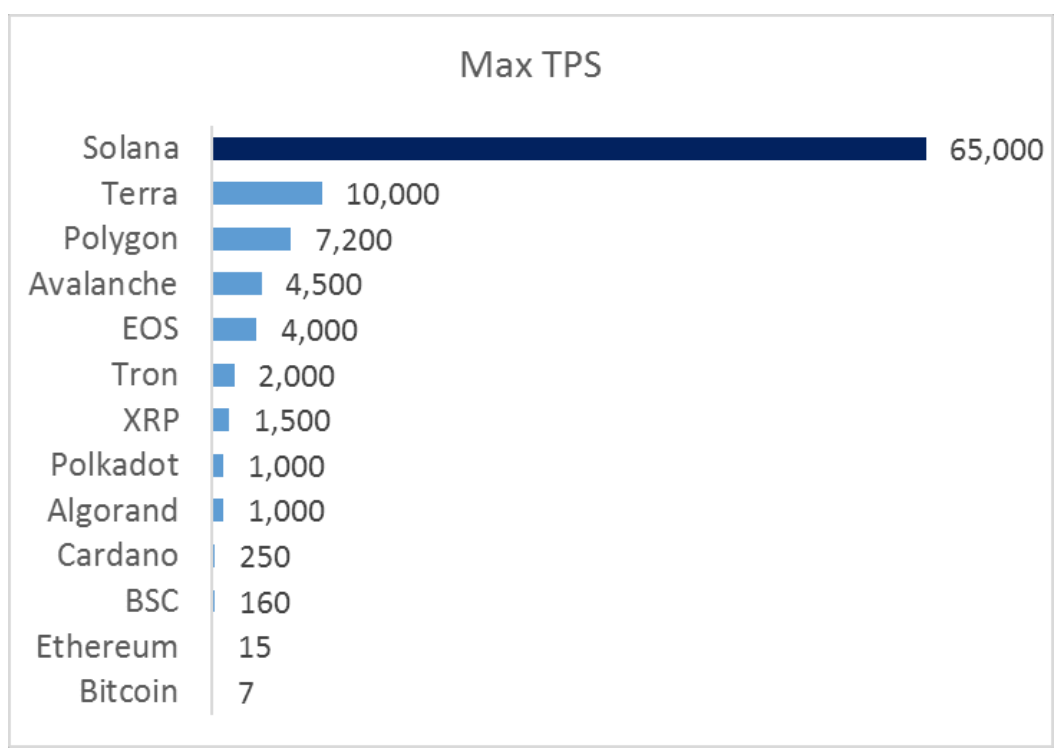
The conclusion from the chart above is obvious — Solana is the undisputed and confident leader of the TPS metric among popular blockchains. It should be noted that Ethereum is currently in the midst of a move to a more efficient Proof of Stake (PoS)-based version, Ethereum 2.0, which is expected to reach speeds of up to 100,000 TPS.
Ethereum plans to move to the new version some time during this year, but, as of now, it still uses the much slower original version as the main chain.
Another advantage of Portal is the extremely low transaction fee of just $0.0001 per transfer.
Currently, Portal processes around 2,000 transfers per day on average. Despite launching support for more than two chains just five months ago, the bridge already holds a respectable TVL of around $1 billion USD as of the time of writing.
In terms of the TVL share, Ethereum and Terra currently dominate on Portal, with $600 million and $329 million USD, respectively. The TVL figures refer to the total amount currently locked in Wormhole’s smart contracts.
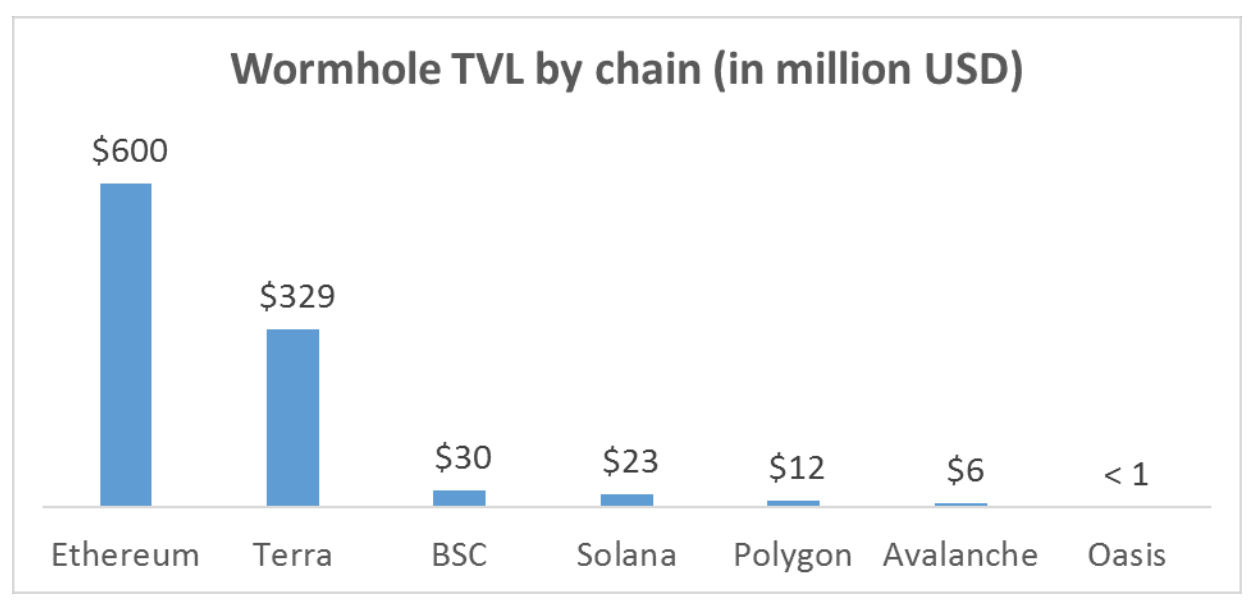 The figures are valid as of January 12, 2022
The figures are valid as of January 12, 2022
Nearly a thousand NFTs are currently locked for transfer on Portal. Solana is the dominant chain in this statistic, with more than 75% of all NFTs.
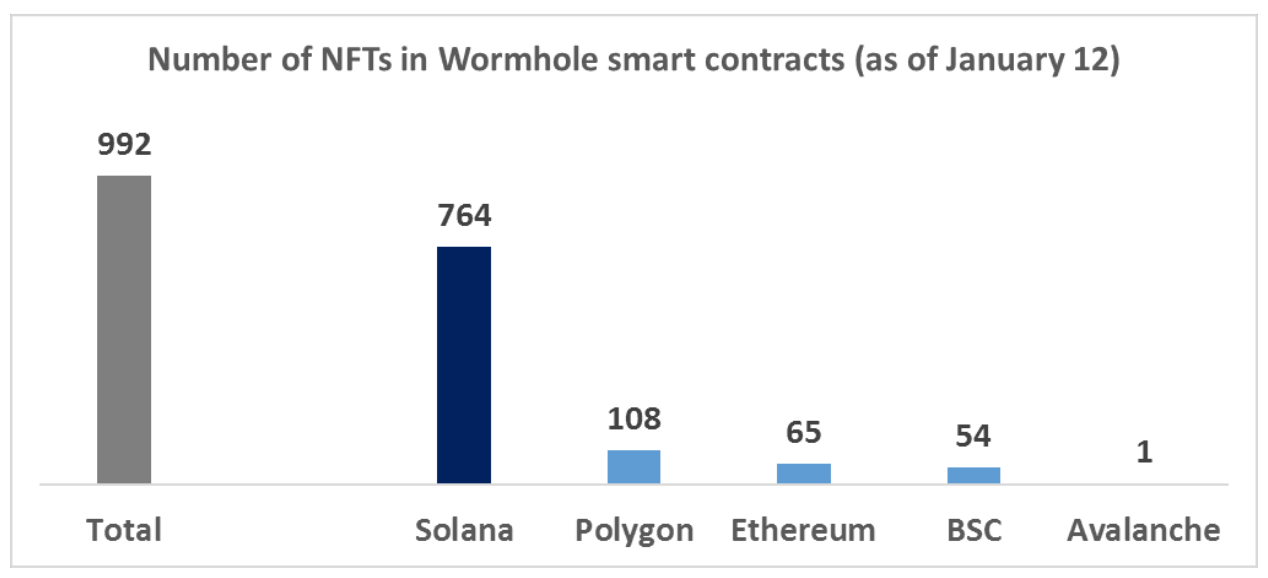
The Portal is a distinct bridge product in the blockchain world. While there is no shortage of cross-chain bridges in the market, those that support Solana are few and far between.
The Portal has attained a TVL of $1 billion USD. Thus, Portal is easily considered a leading solution in this sector of the blockchain space. And with the seven supported chains capturing nearly 90% of the industry-wide TVL, Portal opens up unique opportunities to access the rich DeFi ecosystem across its entire coverage network.
The future outlook of Wormhole and the Portal token bridge is looking incredibly bright. With cross-chain, multi-chain, and bridging the gap between blockchain solutions having become a central topic in crypto over the past year, Portal’s offering is proving to be at the forefront of advancing how users interact with their digital assets. Additionally, with transaction costs being small fractions of a cent, making the technology highly accessible, as well as reputable validator nodes such as Everstake and others ensuring its functionality and security, it’s easy to see why a new generation of users are ready to adopt the Portal Token Bridge.
Sometimes links get changed, which is out of our control, so here’s a PFD download of the article, as well as a text version below.
What Is The Portal Token Bridge: An Overview Of The Project
A few years ago, the world of decentralized apps (dApps) and tokens was all about the Ethereum platform. But today, things have changed drastically, and blockchains such as Solana, Binance Smart Chain (BSC), and Polygon are now home to a thriving and growing variety of dApps and passionate communities.

However, the growth of these blockchains has given rise to a new issue — cross-chain interoperability. By and large, blockchain platforms are independent states with their own rules and without a native ability to support cross-platform token transfers.
In this environment, cross-chain bridges protocols enabling interoperability between different blockchain networks are growing in popularity. One of the most notable of these bridges is the Portal Token Bridge. So in this article, we’ll have an in-depth look at what the Portal Token Bridge is as well as its implications on the blockchain space.
Note: Some time ago, Wormhole made a rebranding. To not be confused now, Wormhole is a protocol, while Portal is a token bridge (formerly known as Wormhole Token Bridge). Let’s find out more about Wormhole and Portal token bridge.
What Is The Portal Token Bridge?
The Portal Token Bridge is a cross-chain protocol designed for efficient crypto token transfers between a number of leading blockchains. Originally built on Solana as a bi-directional bridge for Solana and Ethereum cross-transfers, Portal now supports transfers between seven distinct platforms, which include:
The seven chains supported by the Wormhole and Portal token bridge collectively have a total value locked (TVL) of around $201 billion USD, which represents 88% of the entire DeFi industry TVL of $229 billion.
When users send tokens from one platform to another, Portal wraps the transferred tokens on the destination platform into a platform-specific wrapped token format. For example, if you send some BNB coins from BSC to your wallet on Solana, the funds will arrive as wrapped BNB (WBNB) coins based on Solana’s SPL token format.
How Does The Portal Token Bridge Work?
The Portal token bridge uses special validator nodes called Guardians to enable the cross-chain transfer process. The guardian nodes continually monitor the transfer activity on the bridge. When a user requests a transfer, the nodes verify the request, register it, and burn the sender platform’s native tokens in the requested transfer amount.
Immediately after burning the tokens on the sender’s chain, the guardians mint the corresponding number of native tokens on the receiver’s chain. Continuing with our example from the previous section, when you send 1 BNB from BSC to Solana, guardian nodes burn that BNB on the BSC chain, then create 1 WBNB in Solana, and send it to your specified Solana-based wallet.
Fees Involved
Although we used the 1:1 BNB to WBNB transfer ratio in our example for simplicity purposes, in reality, you will not receive the full 1 WBNB after the transfer as there are fees involved in executing it. There are two kinds of fees that will be shaved off your crypto funds during the transfer.
One is the transaction fee charged by the bridge itself for facilitating the cross-chain service. This fee is minuscule — only about $0.0001 per transaction. The other fee type is the gas fee, payable to both the sender and receiver chains, and has nothing to do with the Wormhole protocol.
The gas fees are charged by the native chains to enable any transactions involving crypto assets. The gas fees to execute Portal transfers are also very modest if you consider the chains used in our example — BSC and Solana. All the chains supported by Wormhole and Portal token bridge, with the exception of Ethereum, typically charge very modest amounts in gas fees.
Typical gas fees on BSC, Solana, Polygon, Avalanche, and Oasis are under one cent unless you transfer very large amounts, in which case it might rise to just a few cents. On Terra, gas fees might be somewhat higher. Terra’s current average gas fee is around $0.15 USD. However, if your transfer involves a stablecoin, there will be an additional stability fee charged by Terra on top of the standard gas fee.
The stability fee might be up to 1% of the transfer amount but is capped at 1 SDT (approximately $1.5 USD). Thus, even a large cross-chain transfer involving Terra will only set you back less than $2 USD.
The only chain where your Portal transfer might be affected by substantial gas fees is of course Ethereum. The world’s largest DeFi chain’s relatively high gas fees have come to be expected in the industry, and as of the time of writing, Ethereum’s average gas fee is exponentially higher than other chains even at its lowest base fee. Additionally, it frequently spikes into double digits, depending on the network activity, so if your cross-chain transfer is substantial and involves Ethereum as a sending or receiving chain, your overall fees might not be trivial.
Supported Wallets
Portal supports four wallets to receive funds on Solana. The supported wallets are Solflare, Sollet, Phantom, and Math Wallet. However, for the other 6 chains, your choice is limited to MetaMask.
Network of Guardians
The guardian nodes, which enable the key functionality of the cross-chain transfers, are typically large-scale institutional staking service providers that have been actively involved in Solana staking and are trusted by the platform.
There are 19 of these guardian nodes in total, and their list includes some of the largest and most prominent staking providers in the blockchain world, for example, Everstake.
Any transfer on Portal must be validated by at least two-thirds of the guardians, and the guardians have an equal weight/vote in the validation process.
Key Advantages of the Portal Token Bridge
The biggest advantage of Portal is, undoubtedly, access to a wide range of DeFi services across the seven supported chains. For example, by using Portal, you can transfer any ERC-20 DeFi token from Ethereum to another chain, and take advantage of the DeFi services on these alternative platforms.
For Ethereum token holders, a big advantage of utilizing the other chains is the lower gas fees on them. Conversely, token holders on the other six chains may transfer funds to Ethereum and take advantage of the variety offered by the largest collection of DeFi apps in the blockchain world.
Another distinct advantage of Portal is the ability to provide a cross-chain link specifically to and from Solana. While there are a number of other cross-chain bridges on the market, the majority of them do not support the Solana platform.
And although Solana cannot boast the dApp variety currently enjoyed by Ethereum, the chain is known for its industry-leading transaction speeds and development support is consistently increasing. Additionally, if the speed of transacting and the scalability it brings are critical to you, leveraging Solana is worth looking into. Below is a list of the reported maximum transaction per second (TPS) speeds on leading blockchains, illustrating Solana’s technical superiority.
The conclusion from the chart above is obvious — Solana is the undisputed and confident leader of the TPS metric among popular blockchains. It should be noted that Ethereum is currently in the midst of a move to a more efficient Proof of Stake (PoS)-based version, Ethereum 2.0, which is expected to reach speeds of up to 100,000 TPS.
Ethereum plans to move to the new version some time during this year, but, as of now, it still uses the much slower original version as the main chain.
Another advantage of Portal is the extremely low transaction fee of just $0.0001 per transfer.
Key Figures of the Portal Token Bridge
Currently, Portal processes around 2,000 transfers per day on average. Despite launching support for more than two chains just five months ago, the bridge already holds a respectable TVL of around $1 billion USD as of the time of writing.
In terms of the TVL share, Ethereum and Terra currently dominate on Portal, with $600 million and $329 million USD, respectively. The TVL figures refer to the total amount currently locked in Wormhole’s smart contracts.
NFT Stats
Nearly a thousand NFTs are currently locked for transfer on Portal. Solana is the dominant chain in this statistic, with more than 75% of all NFTs.
Future Outlook
The Portal is a distinct bridge product in the blockchain world. While there is no shortage of cross-chain bridges in the market, those that support Solana are few and far between.
The Portal has attained a TVL of $1 billion USD. Thus, Portal is easily considered a leading solution in this sector of the blockchain space. And with the seven supported chains capturing nearly 90% of the industry-wide TVL, Portal opens up unique opportunities to access the rich DeFi ecosystem across its entire coverage network.
The future outlook of Wormhole and the Portal token bridge is looking incredibly bright. With cross-chain, multi-chain, and bridging the gap between blockchain solutions having become a central topic in crypto over the past year, Portal’s offering is proving to be at the forefront of advancing how users interact with their digital assets. Additionally, with transaction costs being small fractions of a cent, making the technology highly accessible, as well as reputable validator nodes such as Everstake and others ensuring its functionality and security, it’s easy to see why a new generation of users are ready to adopt the Portal Token Bridge.